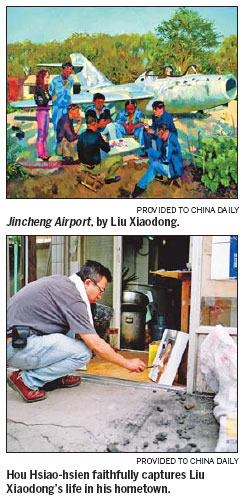Painter's return home lovingly portrayed by art house director

Taiwan director Hou Hsiao-hsien, who has spent the past 20 years making family dramas, decided to take a different path when he met Liu Xiaodong in May 2010.
He followed the internationally acclaimed artist back to his hometown Jincheng, in Liaoning province, where he recorded Liu's paintings and life, resulting in a 72-minute documentary, Hometown Boy.
Liu held an exhibition featuring nearly 30 oil paintings and more than 200 pages of his diary entries at the Ullens Center for Contemporary Art (UCCA) in Beijing, from November 2010 to February. Recently, Hou's documentary was screened at UCCA before the artist and the director sat down to talk to media.
Regarded as a leading figure of Taiwan's "new wave cinema movement" since the 1980s, the award-winning filmmaker, 64, is not one sought out by investors to helm a project for distribution on the mainland. His art house style films are not box office money spinners.
Meanwhile, it is no novelty for Liu, to work with filmmakers. He was the protagonist of director Wang Xiaoshuai's film, The Days (1990). Director Jia Zhangke also focused on his artistic life in the documentary, Dong (2006), which received much acclaim at the Venice Film Festival.
But working with Hou was special for Liu, who says the director showed great sensitivity in capturing the relationship between the artist and his hometown.
Liu's opening lines in the documentary are: "This time I've decided that I am really going home."
Although he returned home almost every Spring Festival, Liu had never really felt like he had been home since he left at the age of 17.
"The director followed me, shared my experiences and recorded it, which touched me," Liu says.
Hou does a fine job of portraying Liu's nervousness as he paints his friends and parents for the first time, his confusion when witnessing the changes in his town and his struggles as he tries to balance commercial considerations with the pursuit of art.
"As a director, I have also struggled to balance art and the market. I have made some sold-out movies. But I went to the other extreme after The Boys From Fengkuei in 1983. I agree with Liu about sticking to one's beliefs, even if no one watches my movies," Hou says.
He not only helped Liu express his homesickness, but also found a different perspective on the mainland.
The small town is known for a paper mill built in the 1950s, which is still the center of the lives of the locals. Some of Liu's friends used to work there but were laid off.
The documentary shows the paper mill, the crowds, the traveling train and the farms surrounding it.
"Liu's nostalgia is obvious and his emotions complex as the place is not what he remembered it to be. What I saw behind Liu's nostalgia is the mainland's transition. The film's shooting offered me a chance to look at the mainland And I felt what Liu felt," Hou says.
China Daily
(China Daily 03/24/2011 page18)














